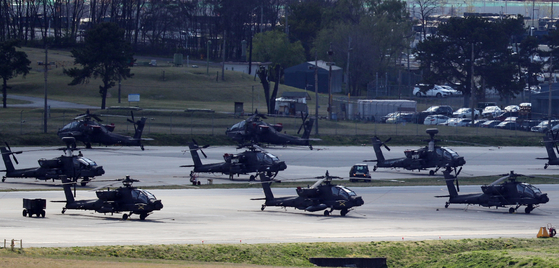![In April 2020, U.S. President Donald Trump rejected a 13% increase proposed by South Korea in relation to the defense cost share, and negotiations between the United States and the ROK continued to stall. However, with the inauguration of the Biden administration, the discussion on the ante is rapidly rising. [연합뉴스]](https://i0.wp.com/pds.joins.com/news/component/htmlphoto_mmdata/202102/14/3a617d9e-4edd-4357-abe2-e484035beff3.jpg?w=560&ssl=1)
In April 2020, U.S. President Donald Trump rejected a 13% increase proposed by South Korea in relation to the defense cost share, and negotiations between the United States and the ROK continued to stall. However, with the inauguration of the Biden administration, the discussion on the ante is rapidly rising. [연합뉴스]
There are observations that the conclusion of the Korea-US Defense Contribution Agreement (SMA) is imminent. The two sides reached consensus on the condition of raising the contribution by 13% compared to the previous (1.389 trillion won), and it is predicted that a final agreement can be drawn soon after fine adjustments are made to detailed conditions. An official from the Ministry of Foreign Affairs said on the 14th, “We cannot disclose the details of the negotiations, but we are in close discussion to come up with an agreement that both sides can accept.” said.
Earlier, the US CNN cited multiple sources on the 11th (local time), citing multiple sources, saying that it is highly likely that the two sides will agree to a multi-year contract with an amount that is 13% higher than the existing defense cost share. The media also reported that the final agreement could include an agreement that the South Korean defense budget would be mandated to expand and that South Korea would purchase certain military equipment. In this regard, a military official said, “There is no specific schedule, but I know that discussions are underway as reported by (foreign media). As it has already passed the deadline for negotiations, we are focusing on agreements that are valid for many years, not short term.”

USFK defense cost share trend. Graphic = Reporter Cha Junhong [email protected]
These conditions are similar to those that were tentatively agreed between the two sides in March last year. At that time, the two countries tentatively agreed on a plan to raise the defense cost share in 2020 by 13% from 2019 (1.389 trillion won), but President Donald Trump adhered to the “50% increase rule” and did not reach a final agreement. On the other hand, the Biden administration implied its position to complete the defense cost share negotiations as soon as possible, and informed the trend that it would not go all-in to’counting the numbers’ like the Trump administration did.
![In March of last year, members of civil society organizations held a press conference in front of the Blue House, protesting the unreasonable demands of the United States regarding the negotiations for the ROK-US defense cost share. [연합뉴스]](https://i0.wp.com/pds.joins.com/news/component/htmlphoto_mmdata/202102/14/ca0b5731-11eb-41dd-9e7a-157f15d79141.jpg?w=560&ssl=1)
In March of last year, members of civil society organizations held a press conference in front of the Blue House, protesting the unreasonable demands of the United States regarding the negotiations for the ROK-US defense cost share. [연합뉴스]
Such a move can be interpreted as reflecting the intention of the Biden administration, which emphasizes’restore alliance’. In addition, President Biden’s recognition of the rationality of the negotiation process, such as criticizing the Trump administration’s pressure to raise defense costs as “alliance extortion,” seems to have worked. In fact, the US and Korea have been accelerating recent negotiations, such as holding the 8th meeting to discuss the 8th ante on the 5th. Foreign Minister Eui-yong Eui also agreed on a call with U.S. Secretary of State Tony Blingen on the 12th to settle the ante negotiations as soon as possible.
However, there are many observations that the hidden bills of the biden administration’s defense cost share negotiations are outside the numbers, not the amounts. Money will not come to the fore as it did in the Trump administration, but instead, the expansion of Korea’s role in the Asia-Pacific region, namely the “sharing of alliance responsibilities” such as joining China’s checks, can replace the number of contributions.
Reporter Jeong Jin-woo [email protected]
